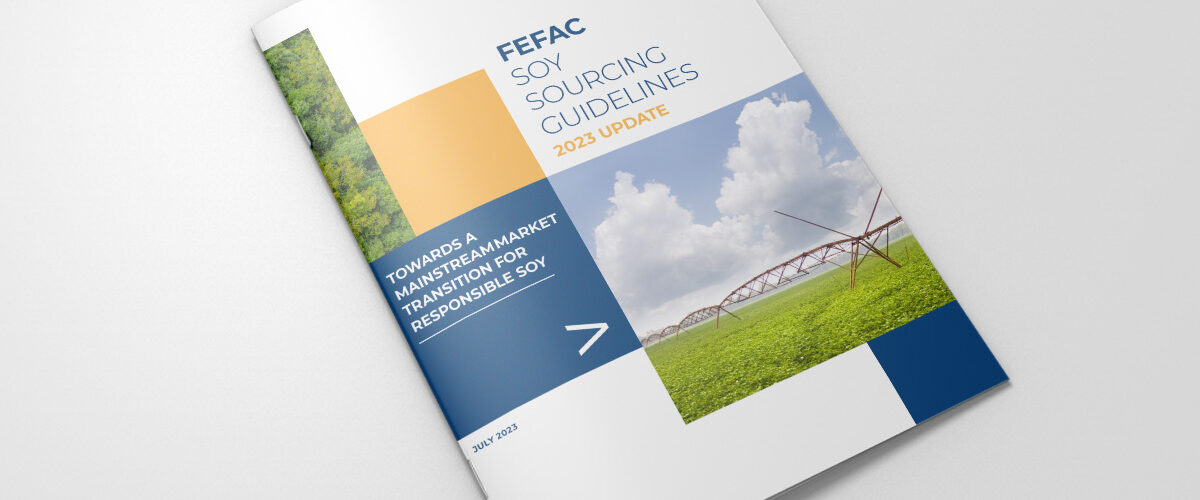
U.S. Soy Achieves Key Sustainability Benchmark in Europe Independent Verification Confirms Industry-Leading Conservation Practices of U.S. Soybean Farmers
ST. LOUIS, MO – May 31, 2024 – The European Compound Feed Manufacturers’ Federation (FEFAC) has confirmed the U.S. Soy Sustainability Assurance Protocol (SSAP), an internationally recognized tool for verifying the sustainability of U.S. soybeans, meets sustainable production standards as outlined in its updated 2023 Soy Sourcing Guidelines.
The FEFAC guidelines are designed to support transparency in soy sourcing for 27 European nations and include a wide range of agricultural, environmental and social requirements. Benchmarking for FEFAC Soy Sourcing Guidelines is facilitated by the International Trade Centre, a joint agency of the United Nations and the World Trade Organization, aiming to foster inclusive and sustainable growth and development through trade and international business development.
“The FEFAC Soy Sourcing Guidelines cover a wide sustainability spectrum including aspects of good agricultural practices, responsible working conditions and other environmental protection measures,” said FEFAC President Pedro Cordero. “The 2023 update strengthened several requirements, including upgrading the criterion on conversion-free soy as an essential one, and we are pleased the SSAP has once again passed the benchmarking exercise.”
“With updates that safeguard natural forests, native grasslands, wetlands, and other ecosystems, FEFAC’s sustainable sourcing guidelines remain among the most comprehensive in the world,” said Abby Rinne, Director of Sustainability at the U.S. Soybean Export Council. “Meeting these certification requirements underscores the leadership of U.S. soybean farmers in sustainable production practices and U.S. Soy’s commitment to providing sustainable, high-quality soy to international customers.”
The SSAP has been recognized as compliant with FEFAC Soy Sourcing Guidelines since 2015 and has met the conversion-free criteria since the 2021 benchmarking. A total of 33.7 million metric tons of SSAP-verified U.S. Soy have been exported to Europe since the SSAP’s initial benchmarking against FEFAC’s guidelines. In 2023, 99 percent of all U.S. soybean shipments to Europe carried an SSAP certificate.
The SSAP carries additional third-party accreditations from the Sustainable Agriculture Initiative Platform’s Farm Sustainability Assessment and the Global Seafood Alliance Best Aquaculture Practices feed mill standards.
U.S. Soy plays an essential role in addressing the United Nations Sustainable Development Goals by supplying high-quality protein for animal and human nutrition while implementing climate-smart agricultural practices in soy production. U.S. soybean farmers implement a range of sustainability best practices to produce higher yields and using fewer resources, including land use. For example, between 1997 and 2017, total cropland in the U.S. declined by 12.5 million hectares and U.S. forestland increased more than 740,000 hectares.1
The SSAP is one part of the overall U.S. Soy producer sustainability program. These processes and practices of U.S. farmers contribute to the improvement of environmental, social and economic sustainability outcomes over time. Learn more in the SSAP 2023 Annual Report.
This press release was funded in part by the soy checkoff
MEDIA CONTACTS
Kerrey Kerr-Enskat
USSEC Communications Director
+1 (515) 823-1848, kenskat@ussec.org
Mary Peck
USSEC Communications Manager
+1 (303) 570-3880, marypeck@ct.dev-ussec-migration.pantheonsite.io
About U.S. Soy Sustainability Assurance Protocol
The U.S. Soy Sustainability Assurance Protocol (SSAP) is a tool that aggregates sustainability and conservation principles to verify sustainable soy production on U.S. soybean farms. U.S. soybean production is based on a national system of sustainability and conservation laws and regulations combined with careful implementation of best production practices by more than 270,000 U.S. soybean farms. The SSAP is one part of the overall U.S. Soy producer sustainability program.
About the U.S. Soybean Export Council
The U.S. Soybean Export Council (USSEC) focuses on differentiating, elevating preference, and attaining market access for the use of U.S. Soy for human consumption, aquaculture, and livestock feed in 80+ countries internationally. USSEC members represent the soy supply chain including U.S. Soy farmers, processors, commodity shippers, merchandisers, allied agribusinesses, and agricultural organizations. USSEC is funded by the U.S. soybean checkoff, USDA Foreign Agricultural Service matching funds, and industry. Visit www.dev-ussec-migration.pantheonsite.io for the latest information on U.S. Soy solutions and news about USSEC and U.S. Soy internationally.